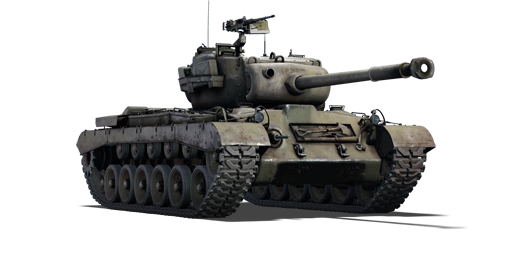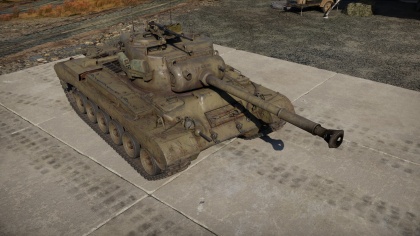Difference between revisions of "M46"
(Added About template) |
(Updated w/ Specs, Battle-rating) |
||
| Line 10: | Line 10: | ||
[[File:GarageImage_M46Patton.jpg|420px|thumb|left]] | [[File:GarageImage_M46Patton.jpg|420px|thumb|left]] | ||
{{break}} | {{break}} | ||
| − | The ''' | + | The '''{{Specs|name}}''' is a Rank {{Specs|rank}} American medium tank {{Battle-rating}}. It is one of the first American tanks to be released with the American ground tree in [[Update 1.45 "Steel Generals"]]. As an upgraded version of the [[M26|M26 Pershing]], it features many similarities to its predecessors, but is improved with a better gun and engine for increased firepower and mobility. |
== General info == | == General info == | ||
Revision as of 19:18, 19 March 2019
Contents
| This page is about the medium tank M46. For the premium version, see M46 “Tiger”. |
Description
The Medium Tank M46 Patton is a Rank IV American medium tank
with a battle rating of 7.0 (AB/RB) and 6.7 (SB). It is one of the first American tanks to be released with the American ground tree in Update 1.45 "Steel Generals". As an upgraded version of the M26 Pershing, it features many similarities to its predecessors, but is improved with a better gun and engine for increased firepower and mobility.
General info
Survivability and armour
Armour type:
- Cast homogeneous armour (Turret, Front)
- Rolled homogeneous armour (Side, Rear, Roof)
| Armour | Front (Slope angle) | Sides | Rear | Roof |
|---|---|---|---|---|
| Hull | 101.6 mm (42-46°) Front Glacis 162.5 mm (25-60°) Upper front glacis 76.2 mm (26-53°) Lower Glacis |
76.2 mm Front 50.8 mm (0-9°) Rear |
50.8 mm Top 22.2 mm (65°) Bottom |
22.2 mm |
| Turret | 101.6 mm (1-55°) Turret front 114.3 mm (1-84°) Gun mantlet |
76.2 mm (3-54°) | 76.2 mm (0-79°) | 25.4 mm |
| Armour | Sides | Roof | ||
| Cupola | 76.2 mm | 25.4 mm |
Notes:
- Suspension wheels and tracks are 20 mm thick.
- Belly armour is 25.4 mm thick.
Mobility
| Mobility characteristic | ||
|---|---|---|
| Weight (tons) | Add-on Armor weight (tons) |
Max speed (km/h) |
| 43.7 | N/A | 53 (AB) |
| 47 (RB/SB) | ||
| Engine power (horsepower) | ||
| Mode | Stock | Upgraded |
| Arcade | 1,255 | 1,545 |
| Realistic/Simulator | 716 | 810 |
| Power-to-weight ratio (hp/ton) | ||
| Mode | Stock | Upgraded |
| Arcade | 28.72 | 35.35 |
| Realistic/Simulator | 16.38 | 18.53 |
Armaments
Main armament
| 90 mm M3A1 | |||||
|---|---|---|---|---|---|
| Capacity | Vertical guidance |
Horizontal guidance | |||
| 70 | -10°/+20° | ±180° | |||
| Turret rotation speed (°/s) | |||||
| Mode | Stock | Upgraded | Prior + Full crew | Prior + Expert qualif. | Prior + Ace qualif. |
| Arcade | 15.17 | 20.90 | 25.40 | 28.10 | 29.90 |
| Realistic | 15.17 | 17.80 | 21.60 | 23.90 | 25.40 |
| Reloading rate (seconds) | |||||
| Stock | Prior + Full crew | Prior + Expert qualif. | Prior + Ace qualif. | ||
| 11.05 | 9.78 | 9.00 | 8.50 | ||
Ammunition
| Penetration statistics | |||||||
|---|---|---|---|---|---|---|---|
| Ammunition | Type of warhead |
Penetration in mm @ 90° | |||||
| 10m | 100m | 500m | 1000m | 1500m | 2000m | ||
| M318 shot | AP | 192 | 191 | 179 | 165 | 152 | 139 |
| M71 shell | HE | 13 | 13 | 13 | 13 | 13 | 13 |
| M82 shot | APCBC | 170 | 169 | 164 | 151 | 138 | 127 |
| M304 shot | APCR | 264 | 260 | 245 | 226 | 210 | 191 |
| M332 shot | APCR | 271 | 270 | 245 | 217 | 192 | 170 |
| M348 shell | HEATFS | 305 | 305 | 305 | 305 | 305 | 305 |
| Shell details | |||||||||
|---|---|---|---|---|---|---|---|---|---|
| Ammunition | Velocity in m/s |
Projectile Mass in kg |
Fuse delay
in m: |
Fuse sensitivity
in mm: |
Explosive Mass in g (TNT equivalent): |
Normalization At 30° from horizontal: |
Ricochet: | ||
| 0% | 50% | 100% | |||||||
| M318 shot | 853 | 11 | N/A | N/A | N/A | -1° | 47° | 60° | 65° |
| M71 shell | 823 | 11 | 0.1 | 0.5 | 925 | +0° | 79° | 80° | 81° |
| M82 shot | 853 | 11 | 1.2 | 20 | 137.2 | +4° | 48° | 63° | 71° |
| M304 shot | 1021 | 7.6 | N/A | N/A | N/A | +1.5° | 66° | 70° | 72° |
| M332 shot | 1178 | 5.6 | N/A | N/A | N/A | +1.5° | 66° | 70° | 72° |
| M348 shell | 853 | 6.5 | 0.0 | 0.1 | 926.17 | +0° | 65° | 72° | 75° |
| Smoke characteristic | ||||||
|---|---|---|---|---|---|---|
| Ammunition | Velocity in m/s |
Projectile Mass in kg |
Screen radius in m |
Screen time in s |
Screen hold time in s: |
Explosive Mass in g (TNT equivalent): |
| M313 | 821 | 11 | 13 | 5 | 20 | 50 |
Ammo racks
| Full ammo |
1st rack empty |
2nd rack empty |
Visual discrepancy |
|---|---|---|---|
| 70 | 61 (+9) | 1 (+69) | No |
Machine guns
| 12.7 mm M2HB | ||||||
|---|---|---|---|---|---|---|
| Pintle mount | ||||||
| Capacity (Belt capacity) | Fire rate (shots/minute) |
Vertical guidance |
Horizontal guidance | |||
| 1,000 (200) | 576 | -10°/+50° | ±120° | |||
| 7.62 mm M1919A4 | ||||||
|---|---|---|---|---|---|---|
| Coaxial mount | ||||||
| Capacity (Belt capacity) | Fire rate (shots/minute) |
Vertical guidance |
Horizontal guidance | |||
| 4,900 (250) | 500 | N/A | N/A | |||
Usage in the battles
The tank plays almost like the M26 Pershing, it's relatively fast for its size yet has a very powerful gun. In comparison, the M46 Patton features improved maneuverability with increased acceleration, it also has a better gun to combat the foes it will face at its rank. Due to this, the M46 Patton can fit into multiple roles like the Pershing as an offensive or supporting unit. Attack and flank enemy units with cooperation of allied units to get their more vulnerable sides.
At this rank, the more heavy duty vehicles appears such as the IS-3, 10.5cm Tiger II, T32, and the Maus. These tanks are a menace to not just you, but possibly your entire team. Taking these tanks out in the M46 Patton require close cooperation with other allies in order to get around and hit them in their side armour. More powerful ammunition unlocked in later modifications may improve your attempts at destroying these beasts.
Modules
Get Parts and FPE like the usual routine to increase the tank's survivability. After that, work towards the APCR and especially the HEATFS round at the Rank III and IV modifications to boost your firepower against the enemy at the battle rating.
Pros and cons
Pros:
- Powerful 90mm main cannon, especially with HEATFS rounds.
- Decent speed/agility, better than M26 Pershing.
- Low profile.
- Neutral steering.
- Rear mounted transmission.
- Excellent gun depression of -10 degs.
Cons:
- Turret ring is prone to breaking.
- Elevation gear is slow.
- Armour can easily be pierced by other tanks at it's rank.
- Struggles to penetrate many opponents from the front without HEATFS
History
Development
The M46 Patton came about around the time of the Korean War. Before that, the US Army armoured units consisted of two tanks, the venerable M4 Shermans and the newer M26 Pershings. Of the two, the Pershing was originally classified as a heavy tank as it weighed 41.7 tons compared to the Sherman's 30 ton weight, but a reorganization had the M26 Pershing classified a medium tank after World War II. It proved unsuitable for the role as its mobility was unsatisfactory for that role, using the same Sherman engine, plus an unreliable transmission, to propel a vehicle ten tons heavier.
Work began in January 1948 to upgrade the Pershing's mobility with a new engine and transmission. The project was initially designated the M26E2, but as newer upgrades and more modifications are installed onto the tank, it began to feel more like a completely new design rather than a Pershing upgrade, so it was decided to give the model a completely new designation. The end result was the Pershing tank mounting the mentioned upgrades, plus a new power plant and gun with a bore evacuator to expunge propellant fumes. This model was designated the M46 Patton, named after General George S. Patton, the commander of the US Third Army and played a role in the establishment of American tank forces. The rebuilding of the tanks began in November 1949 and had 1,160 Pershings rebuilt into M46s, 800 to the standard variant and 360 to the M46A1, which had better brakes, a cooling and fire protection system, a new engine and transmission, and better electrical equipments.
Combat usage
The M46 saw combat only during the Korean War. The first batch arrived on August 8, 1950 to the 6th Tank Battalion and proved superior to the North Korean and Chinese T-34-85s. About 200 M46 Pattons arrive to Korea by the end of 1950, making up 15% of the American armoured strength, though the majority was still the M4 Shermans. By 1951, all M26 Pershings in Korea were withdrawn and replaced by the M46 Pattons, and eventually the units with Shermans were also reequipped with the newer tanks as well. When the armistice was finally made, ending the conflict in the Korean Peninsula, the M46 Pattons were withdrawn back to the state.
By the later parts of the 1950s, the M46 Pattons in American service still were being replaced by the newer M47 Pattons and those still in the inventory were leased for no cost to Belgium, France, and Italy for training purposes, sending American instructors to train the European crews and maintenance personnel.
Media
An excellent addition to the article will be video guides, as well as screenshots from the game and photos.
Read also
Sources
- Surviving M46 Pattons (PDF)
| USA medium tanks | |
|---|---|
| M2 | M2 |
| M3 | M3 Lee · ▃Grant I |
| M4 | M4 · Calliope · M4A1 · M4A1 (76) W · M4A2 · M4A2 (76) W · M4A3 (105) · M4A3 (76) W · M4/T26 |
| M26 Pershing | T20 · T25 · M26 · M26 T99 · M26E1 |
| M46/47/48 Patton | M46 · M46 "Tiger" · M47 · M48A1 · T54E1 · T54E2 |
| M60 | M60 · M60A1 (AOS) · M60A1 RISE (P) · M60A2 · M60A3 TTS · M728 CEV · 120S |
| MBT-70 | MBT-70 · XM803 |
| M1 Abrams | XM1 (Chrysler) · XM1 (GM) |
| M1 Abrams · M1 KVT · IPM1 | |
| M1A1 · M1A1 HC · M1A1 Click-Bait | |
| M1A2 Abrams · M1A2 SEP · M1A2 SEP V2 | |
| Other | T95E1 |
| Australia | M1A1 AIM |
| Canada | M4A5 |
| Israel | ▃Magach 3 (ERA) · ▃Merkava Mk.1 · ▃Merkava Mk.2B · ▃Merkava Mk.3D |
| Turkey | M60 AMBT |





